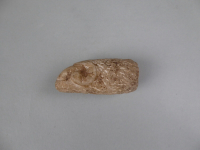



square canopic chest with cornice and sled; canopic chest with 4 compartments
An item at Louvre
Anubis (dog, lying down, collar) Decoration: front face; scene of worship; man (standing, pleated loincloth in front and folded down, shirt with sleeves, wig in pockets, cone of perfume, worshiping); Osiris (seated); Nebrid back face; scene of offering; man (standing, presenting, tray: offerings, in front); Anubis (god with dog's head, standing, pschent crown) right face; scene of worship; man (standing, holding, ewer, in front); Hapi (god with monkey's head, standing); Qebehsenuf (god with falcon's head, standing) left face; scene of worship; man (standing, shaved head, worshiping); Amset (standing); Duamutef (god with dog's head, standing)
Department of Egyptian Antiquities
An exhibit at Louvre
The collections of the Department of Egyptian Antiquities present the civilization that evolved on the banks of the Nile, from the end of Prehistory (around 4,000 BCE) to the Christian era (from the 4th century CE).




